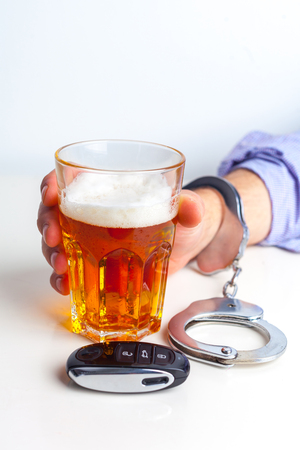MADD's 2018 Report on Drunken Driving Released
February 28, 2018 | Category: DUI Accidents | ShareMADD’s 2018 Report to the Nation ranks all states based on ignition interlock laws, sobriety checkpoints, ALR (automatic license revocation), child endangerment, and no refusal.
 Following are MADD’s comments on the five areas listed above:
Following are MADD’s comments on the five areas listed above:
- Ignition interlock laws - MADD believes every drunk driver should use an ignition interlock for at least six months, starting with the first offense. The only option for driving after a drunk-driving offense is with the device installed. The in-car breathalyzers prevent a vehicle from starting if the driver’s blood alcohol concentration (BAC) exceeds the preset limit.
- Sobriety checkpoints - Frequent, well-publicized sobriety checkpoints save lives by catching drunk drivers already on the road and warning would-be drunk drivers to find another mode of transportation. Checkpoints reduce alcohol-related fatality and injury crashes by 20 percent.
- ALR – ALR is the immediate suspension of a driver’s license by law enforcement at the time of arrest or refusal for DUI. This critical law enforcement tool removes the immediate threat of a drunk driver harming innocent bystanders. MADD advocates for interlocks during ALR, because 50 to 75 percent of offenders continue to drive after losing their driving privileges. ALR allows for other administrative action, such as restricted driving privileges or an ignition interlock requirement, to protect the public while the offender awaits trial.
- Child endangerment – MADD says that driving drunk with a child passenger is a form of child abuse that should be met with additional penalties. MADD recognizes New York’s Leandra’s Law as the nation’s model child endangerment law.
- No refusal - About 20 percent of suspected drunk drivers refuse a sobriety test, which leads to additional time and paperwork for law enforcement officers. This impedes efforts to remove drunk drivers and protect the public. Driving is a privilege, not a right and because of this, refusals should be treated the same as a failed sobriety test. Expedited warrants are needed for law enforcement to collect evidence to help prosecute drunk drivers.
Florida’s rank in the MADD Report to the Nation was 2.5. MADD recommends the following ways for Florida to improve:
- Pass an all-offender ignition interlock law
- Make ignition interlocks available to first-time offenders upon request
- Enact a law making child endangerment a felony
- Pass a law requiring ignition interlocks or criminalizing refusal to submit to an alcohol test
When MADD’s campaign began in 2006, 12 years ago, there were about 13,000 drunk-driving deaths per year. Now those deaths are down by 23.5 percent. Its campaign is believed to have experienced “tremendous success”. However, drunk-driving deaths increased in 2015 and 2016 in spite of MADD’s campaign to eliminate drunk driving. J.T. Griffin, MADD’s chief government affairs officer said recently, “We are not discouraged, but more convinced that the countermeasures we are promoting point to the right course of action. States that are passing the laws we recommend are seeing fewer drunken-driving deaths than states that are failing to take action.”
“We see the devastation drunk-driving accidents have on families, friends and communities and encourage everyone not to drink and drive,” said Fort Myers DUI Accident Attorney, Randall Spivey of Spivey Law Firm, Personal Injury Attorneys, P.A.
Hurt By Drunk Driver Attorney, Randall L. Spivey is a Board Certified Trial Attorney – the highest recognition for competence bestowed by the Florida Bar and a distinction earned by just one (1%) percent of Florida attorneys. He has handled over 2,000 personal injury and wrongful death cases throughout Florida. For a free and confidential consultation to discuss your legal rights, contact the Spivey Law Firm, Personal Injury Attorneys, P.A., in Lee County at 239.337.7483 or toll free at 1.888.477.4839,or by email to Randall@SpiveyLaw.com. Visit SpiveyLaw.com for more information. You can contact Spivey Law Firm, Personal Injury Attorneys, P.A.in Charlotte County at 941.764.7748 and in Collier County 239.793.7748.

